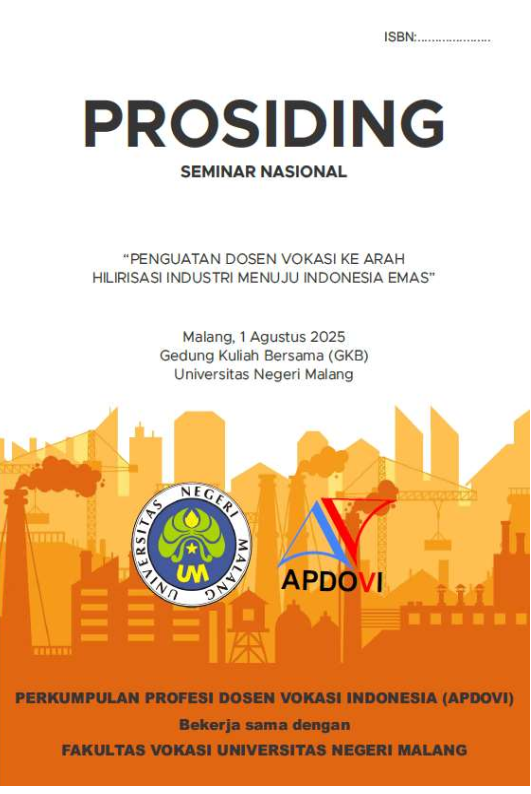Dari Ketergantungan Menuju Kemandirian: Pendekatan Terapi Okupasi Berbasis 4QM bagi Remaja dengan Disabilitas Intelektual
Abstrak
Masa remaja adalah masa perubahan besar, tidak hanya fisik, tetapi juga tuntutan terhadap kemandirian dalam aktivitas sehari-hari. Bagi remaja dengan disabilitas intelektual, tantangan ini menjadi lebih kompleks, termasuk dalam keterampilan berpakaian seperti memakai miniset. Aktivitas yang tampak sederhana ini ternyata membutuhkan pemahaman konseptual, koordinasi motorik, dan adaptasi sosial yang tidak sedikit. Penelitian ini mengkaji bagaimana penerapan terapi okupasi dengan kerangka The Four-Quadrant Model of Facilitated Learning (4QM) dapat mendukung remaja awal dengan disabilitas intelektual untuk lebih mandiri dalam memakai miniset. Melalui pendekatan bertahap — mulai dari instruksi eksplisit, demonstrasi, penggunaan isyarat fisik dan visual, hingga pemberian umpan balik — klien dilatih untuk membangun kepercayaan diri dan keterampilan praktis yang dibutuhkan.Hasil intervensi menunjukkan bahwa dengan modifikasi cara, alat, dan lingkungan, klien mampu menunjukkan peningkatan yang nyata dalam kemandirian berpakaian. Tidak hanya meningkatkan performa aktivitas, tetapi juga memberikan dampak positif terhadap rasa percaya diri dan kesiapan sosial klien.
Studi ini menegaskan pentingnya penerapan model pembelajaran terstruktur seperti 4QM dalam praktik terapi okupasi untuk mendukung transisi kemandirian remaja dengan disabilitas intelektual.
Referensi
Adibsereshki, N., Abkenar, S. J., Ashoori, M., & Mirzamani, M. (2014). The effectiveness of using reinforcements in the classroom on the academic achievement of students with intellectual disabilities. Journal of Intellectual Disabilities, 19(1), 83–93. https://doi.org/10.1177/1744629514559313
Ajhuri, K. F. (2019). Psikologi Perkembangan. Jakarta: Penebar Media Pustaka.
American Occupational Therapy Association. (2020). Occupational therapy practice framework: Domain and process fourth edition. American Journal of Occupational Therapy, 4(74). https://doi.org/10.5014/ajot.2020.74S2001
American Occupational Therapy Association. (2020). What is occupational therapy? https://www.aota.org/about/what-is-ot
American Psychiatric Association. (2022). DSM-5-TR Classification. Arlington: Author.
Atchison, B. J., & Dirette, D. P. (2022). Conditions in Occupational Therapy: Effect on Occupational Performance (6th ed.). North America: LWW.
Badan Pusat Statistik. (2019). Profil Anak Indonesia. Kementerian Pemberdayaan Perempuan dan Perlindungan Anak (KPPPA).
Burckley, E., Tincani, M., & Guld Fisher, A. (2014). An iPadTM-based picture and video activity schedule increases community shopping skills of a young adult with autism spectrum disorder and intellectual disability. Developmental Neurorehabilitation, 18(2), 131–136. https://doi.org/10.3109/17518423.2014.945045
Dani, R. A., Aryono, M. M., & Leylasari, H. T. (2022). Peningkatan Kemampuan Bantu Diri Pada Anak Gangguan Perkembangan Intelektual di Desa Kedung Putri. SHARE “SHaring - Action - REflection,” 8(1), 9–16. https://doi.org/10.9744/share.8.1.9-16
Edemekong, P. F., Bomgaars, D. L., Sukumaran, S., & Schoo, C. (2023). Activities of Daily Living. StatPearls Publishing LLC.
Filycia Mailoa, B., Dektisa, A., Arini, B. D. (2015). Pemilihan Miniset, Pengaruhi Pertumbuhan Payudara Anak. Universitas Kristen Petra Surabaya.
Ghaffari, A., Azad, A., Zarei, M. A., Rassafiani, M., & Sharif Nia, H. (2022). Effect of Occupation Performance Coaching with Four-Quadrant Model of Facilitated Learning on Children with Specific Learning Disorder. Occupational Therapy International, 2022, 7-10. https://doi.org/10.1155/2022/4654204
Ghaffari, A., Azad, A., Zarei, M. A., Rassafiani, M., & Sharif Nia, H. (2022). Efficacy of Occupational Performance Coaching with and without Four Quadrant Model of Facilitated Learning for mothers of children with specific learning disorder: Study protocol for a randomized controlled trial. Contemporary Clinical Trials Communications, 30, 6-7. https://doi.org/10.1016/j.conctc.2022.101009
Greber, C., Ziviani, J., & Rodger, S. (2007). The four-quadrant model of facilitated learning (part 2): Strategies and applications. Australian Occupational Therapy Journal, 0(0). https://doi.org/10.1111/j.1440-1630.2007.00663.x
Hasanah, M. (2021). Girl’s Secret. Jakarta: Stiletto Book.
Hidayati, E. R. (2018). Penatalaksanaan Okupasi Terapi Dalam Aktivitas Menggunakan Beha Dengan Konsep Bobath Pada Pasien Stroke Hemiparesis Sinistra Di Klinik Sasana Husada. Jurnal Vokasi Indonesia, 6(1), 12.
Hurlock, E. B. (2011). Psikologi Perkembangan (5th ed.). Jakarta: Pustaka-Indo.
Imms, C., Granlund, M., Wilson, P. H., Steenbergen, B., Rosenbaum, P. L., & Gordon, A. M. (2017). Participation, both a means and an end: a conceptual analysis of processes and outcomes in childhood disability. Developmental Medicine and Child Neurology, 59(1), 16–25. https://doi.org/10.1111/dmcn.13237
Johnson, K. R., Blaskowitz, M. G., & Mahoney, W. J. (2023). Technology for adults with intellectual disability: Secondary Analysis of a scoping review. Canadian Journal of Occupational Therapy, 000841742311609. https://doi.org/10.1177/00084174231160975
Kemdikbud. (2022, December 16). Kegiatan Bermain Kartu Angka Dapat Meningkatkan Kemampuan Kognitif Pada Anak Usia Dini. https://ayoguruberbagi.kemdikbud.go.id/artikel/kegiatan-bermain-kartu-angka-dapat-meningkatkan-kemampuan-kognitif-pada-anak-usia-dini/
Kemkes. (2014). Peraturan Menteri Kesehatan Republik Indonesia Nomor 25 Tahun 2014. Jakarta: Author.
Kemkes. (2018). Hasil Utama RISKESDAS 2018. Jakarta: Kementerian Kesehatan RI.
King, M., Shields, N., Imms, C., Black, M., & Ardern, C. (2013). Participation of children with intellectual disability compared with typically developing children. Research in Developmental Disabilities, 34(5), 1854–1862. https://doi.org/10.1016/j.ridd.2013.02.029
Kompasiana. (2020, February 12). Setiap Anak Memiliki Kemampuan Kognitif yang Berbeda-beda. https://www.kompasiana.com/endangsrirukmini18160034/5e4417f0097f3649456aebe2/setiap-anak-memiliki-kemampuan-kognitif-yang-berbeda-beda
Kramer, P., & Hinojosa, J. (2020). Frames of Reference for Pediatric Occupational Therapy. (4th ed.). Philadelphia: Wolters Kluwer Health.
Lee, N. R., Godfrey, M., & Hamner, T. (2020). Young Children With Neurodevelopmental Disorders: Intellectual Disabilities. Encyclopedia of Infant and Early Childhood Development, 455–461. https://doi.org/10.1016/B978-0-12-809324-5.23576-1
Mash, Eric., & Wolfe, D. (2016). Abnormal Child Psychology. Boston: Cengage Learning.
Mchugh Pendleton, H., & Schultz-Krohn, W. (2018). Pedretti’s Occupational Therapy Practice Skills for Physical Dysfunction (8th ed.). Missouri: Elsevier.
Mroz, T. M., Pitonyak, J. S., Fogelberg, D., & Leland, N. E. (2015). Client centeredness and health reform: Key issues for occupational therapy. American Journal of Occupational Therapy, 69(5). https://doi.org/10.5014/ajot.2015.695001
Papalia, D. E., Feldman, R. D., & Martorell, G. (2012). Menyelami Perkembangan Manusia (12th ed.). (Fitriana Wuri Hertati, Penerjemah). Jakarta: Salemba Humanika.
Pass the OT. (2014). Intervention Approaches. https://passtheot.com/intervention-approaches/
Reed, K. L. (2013). Quick Reference to Occupational Therapy (3rd ed.). Austin: Pro-Ed Publishers.
Robinson, S., Hill, M., Fisher, K. R., & Graham, A. (2020). Belonging and exclusion in the lives of young people with intellectual disability in small town communities. Journal of Intellectual Disabilities. https://doi.org/10.1177/1744629518765830
Santrock, J. W. (2019). Life-span development (7th ed.). New York: McGraw Hill Education.
Simpson, N., Mizen, L., & Cooper, S.-A. (2020). Intellectual disabilities. Psychiatric Disorders, 48(11), 732-733.
UNICEF. (2022). UNICEF Fact Sheet Children with Disabilities. New York: Author.
Werner, S. (2015). Public stigma and the perception of rights: Differences between intellectual and physical disabilities. Research in Developmental Disabilities, 38, 262–271. https://doi.org/10.1016/j.ridd.2014.12.030
WFOT. (2012). About Occupational Therapy. https://wfot.org/about/about-occupational-therapy
Wuang, Y.-P., Ho, G.-S., & Su, C.-Y. (2013). Occupational therapy home program for children with intellectual disabilities: A randomized, controlled trial. Research in Developmental Disabilities, 528. https://doi.org/10.1016/j.ridd.2012.09.008


